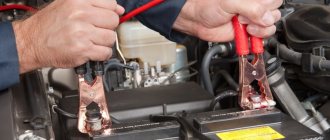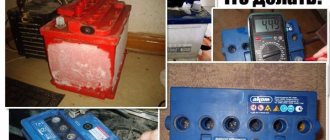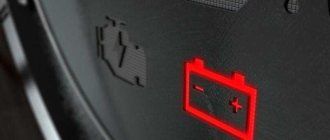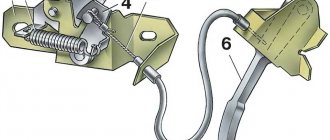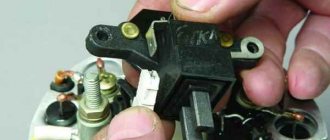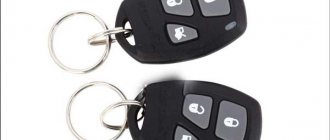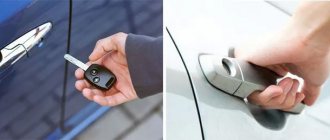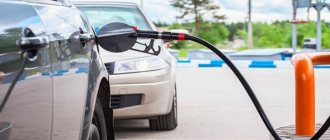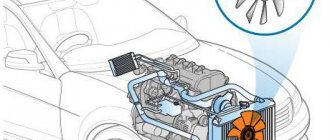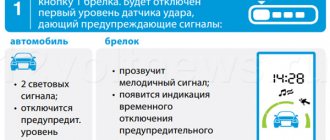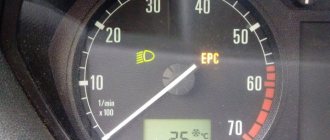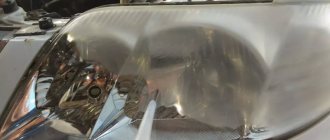It happens that for various reasons the car battery does not have enough energy to start the engine. The most trivial way out of the situation is to charge the battery, but it happens that you still have to get to the charging source. In this case, various methods can come to the aid of the car owner.
Methods for starting a car engine with a discharged battery can be different. The choice depends on various factors - available sources of electricity, vehicle design, etc. Below we will look at 9 of the most common ones.
No. 1 Starting from another battery or car
The most well-known way to start an engine with a discharged battery is to “light it”. It should be noted right away that this method should be used only when the battery is discharged due to an obvious error - the driver forgot to turn off the headlights, music or other powerful consumer. Or if an old or incompletely charged battery cannot turn the engine shaft with oil thickened from the cold.
In cases where the battery is dead due to several unsuccessful starting attempts due to some kind of vehicle malfunction, you cannot light a cigarette until the problem is clarified and fixed. This will not help with other starting methods either, but in this case, instead of one problem car, it’s easy to get two, draining the donor battery.
It is better to “light” from a battery with similar parameters (even better from a more powerful and capacious one). Otherwise, there is a chance to discharge the second battery. If it is possible to remove the battery, it should be placed next to the stalled engine, but usually they are “lighted” directly from another car.
Wires for lighting with alligator clips.
You need to drive as close as possible and connect the positive terminal of the donor car’s battery to the positive terminal of the receiving car. Minus, respectively, with minus (possible with a body part that is not covered with paint). The connection must be made with wires of sufficient cross-section. It is convenient to use conductors with alligator clips.
Wire connection diagram.
There are many myths surrounding the simple connection process. You can find a lot of advice online about the order in which you should connect the car terminals (for example, first the minus of the receiving side, then the minus of the donor, etc.). These tips are never justified by anything and should not be taken seriously. The order in which the terminals are connected does not matter.
It makes a certain sense only to connect the positive conductor first (it doesn’t matter which car to first). As long as the negative (common) wire is not connected, accidental contact with the housing parts by the crocodile will not lead to a short circuit.
It is better to turn off the engine of the vehicle giving off energy. When generators operate in parallel after starting a stalled car, there is a chance of failure of on-board electronic devices, especially if the cars are equipped with different types of generators or one of them is not fully functional. But it is advisable to warm up the engine of the working machine before starting it - so that later it will be easier to start it from the battery, which has given up some of the energy to the donor.
You also need to turn off the power to all powerful electrical receivers on both cars - turn off the headlights, other lighting devices, car audio, etc. (this must be done with other starting methods as well). Immediately after the receiving machine starts, the wires must be removed (the order of disconnection is also not important).
Video instruction.
Portable starter-charger for car 600A GKFLY 12V
Sale!
₽5,695 ₽3,189 Buy with a Discount There are many tips and recommendations on how to start a dead battery and how to start a car if the battery power is not enough to start, but many of these tips are not so easy to apply in real and critical conditions.
The best solution is to be prepared in advance and have a jump starter in your glove compartment or bag, which works great as a power bank for recharging your smartphone, tablet and other gadgets. And the main thing is the ability to solve such a popular problem among motorists, when the car’s battery runs out, independently and instantly.
By the way, today we are giving you a discount of 300 rubles. to purchase the most popular Jump Starter model!
To use it:
- Go to the page for this product and add it to your cart (Open Jump Starter Smart Power 400A).
- Go to Cart and when placing your order, enter this promo code ( starter300 ) in the special field. The amount of your order will be immediately recalculated taking into account the discount.
Use a discount
In any problematic situations related to a weak battery in a car, a jump starter will not only help start it, but may also save lives in a critical situation on the road! After all, when the car stalls in the cold, there is no time to find out the reasons why the battery runs out, you need to act quickly!
No. 2 Wireless lighting
If you don’t have any wires (“ends”) with you, you can temporarily move the charged battery from another car. The donor car must be turned off, the battery removed, installed on the stalled car and connected to the on-board network.
The success of the operation depends on how suitable the battery is in size, capacity, polarity, etc.
After starting, you need to disconnect the battery, remove it and install a standard battery. This is the most dangerous part of the operation. Firstly, you need to be careful not to short-circuit anything, otherwise you can damage not only the battery, but also the generator. And secondly, during operation, the generator can produce pulsed voltage surges. The battery serves as a buffer capacity that smooths out these surges (reduces their amplitude). Therefore, operating the engine without a battery is undesirable - there is a risk of failure of the on-board electronics . This method should be used as a last resort.
Extending battery life
Ways to minimize battery failure:
- proper operation of the vehicle, which includes proper care of it at sub-zero temperatures. In other words, the car can be left in the cold at low temperatures only if the battery is removed from it;
- do not leave the vehicle unattended for a long time;
- when the battery is discharged, it is necessary to provide an emergency charging method or have a spare one;
- you can try to “light” the engine or ask other car enthusiasts to do this;
- use a special charger to quickly start the engine.
There are times when it is impossible to count on someone’s help and only a special device can help. Therefore, the best way out of this situation is considered to be a one-time expenditure on the purchase of charging equipment.
Devices for starting the engine when the battery is dead can be varied:
- Asian origin;
- European;
- CIS countries.
Sometimes a car starting device is called a booster. Unknowing people consider this device to be auxiliary.
- its capacity is much smaller than a regular battery;
- the internal “filling” is also different;
- produces a different voltage.
Connecting a device to start the engine when the battery is dead involves connecting it to the power unit of the vehicle. This booster is only suitable for cars, since the power for its use must be about 12 V.
No. 3 Using ROM
Almost every car owner has a battery charger in their fleet. It is impossible to start the engine from it. The output current of such a device rarely exceeds 10 A (in most cases it is even less). To crank the starter, much higher currents are needed - depending on the situation, up to 100 amperes or more. But there are much less common starter-chargers (ROMs). They operate from the mains and produce much higher currents, sufficient to start the engine.
Starting is carried out in the same way as when “lighting” from another car. First you need to turn on the start mode, then the plus of the ROM is connected to the positive terminal of the battery, and the minus to the minus. The only problem is that the procedure requires a network. And if you already have a charger and 220 volts, then it is better to recharge the dead car battery and start it in normal mode. But if you urgently need to start and drive, then this method is also suitable.
Charger and starting device.
You can also purchase a compact starter that has a built-in battery. In most cases, the capacity of such a mobile battery is not enough to start the engine of a car whose battery is completely discharged. But if the standard battery is a little lacking in energy, then such a device can start the dead battery, help it, and together, the engine will start.
How to use the device?
Tricks for use:
- The process of using the device to start the engine when the battery is dead involves throwing “crocodiles” on the dead battery, as a result of which an electric current will appear. Each manufacturer has different rules for using devices. Therefore, before using it, you must carefully read the instructions, and only then take action.
- Starting the engine with a starter should not harm the battery. A single impact on the battery should not exceed ten seconds.
- Charging only works from the mains. Therefore, if trouble happens on the road, only a cigarette lighter can help.
- When using the booster, it is contraindicated to leave the device in the cold for a long time.
No. 4 Warm water
If the vehicle is parked for several hours in low ambient temperatures, the battery may freeze. This does not mean the electrolyte will harden, but a slowdown in chemical reactions may well occur. It is better to warm up the battery by turning on the high beams for 1-2 minutes. But the disadvantage of this method is that part of the energy is spent on warming up, which may not be enough to turn the engine shaft with thickened oil.
Warming up the battery in a basin of hot water.
Therefore, some car owners warm up the battery in other ways. For example, warm water. This is not very effective, because the battery casing serves as excellent thermal insulation, and the inside of the battery will heat up (and cool down) slowly. But if this method is chosen, you should know that you cannot fill the housing up to the terminals. The water layer should be below the top panel of the battery. Another option is heating with water poured into plastic bottles.
The disadvantage of this path is that the additional thermal resistance of the walls of plastic containers will further reduce heat transfer. It is best to remove the battery in advance and take it to a warm room overnight.
What happens during a discharge depending on time and during a deep discharge in general
The discharge and charge of the battery can be characterized by the battery voltage. Everyone is accustomed to thinking that at maximum charge this parameter is 12V, but this is not so. 12.7V is considered normal. The indicator acquires this value when fully charged.
A strong discharge is a decrease in voltage to 10.5-11V. With such indicators, the car most likely will not be able to start.
A discharge to zero is characterized by a complete absence of voltage.
Deep discharge of the battery negatively affects the condition of the battery. During the discharge, sulfuric acid is absorbed from the electrolyte. During this process, it settles as salt on the plates. Accordingly, the lower the voltage in the battery becomes, the more salt is deposited. The density of the electrolyte drops significantly.
A deep battery discharge is the minimum battery threshold. There is simply nowhere to discharge further. To minimize the negative consequences, you need to charge the battery as soon as possible. This will help remove salts from the plates.
When charging, the density will increase to normal. The distillate will already be absorbed, and the acid content will increase.
Important! As a rule, after a deep discharge, salts do not completely dissolve when charging. It turns out that the plates have virtually no contact with the electrolyte, which prevents the battery from performing its functions.
It is better to carefully monitor the battery discharge and try not to drop the voltage to 11 volts. It's minimum. At values below, the deposition of a salt layer begins.
Possible causes and consequences
The reasons for a strong discharge can be:
- current leakage;
- incorrectly working generator;
- long-term parking;
- appliances not turned off.
Yes, devices that are not turned off also greatly discharge the battery. For example, motorists often forget to turn off their headlights. The battery will be completely discharged overnight.
The consequences of such discharges are the deposition of salts on the plates and a drop in the density of the electrolyte. This, in turn, will lead to the device being damaged. So, deep discharge has a very negative effect on lead-acid batteries. Each deep discharge cycle irreversibly reduces the battery capacity.
Is it possible to recover after a deep discharge?
After a deep discharge, you can restore a car battery by removing salt deposits from the positive plates. This can be done in two ways:
- If crystallization has occurred to the maximum, you can clean it manually. This is done by pulling out the plates and removing the salt from them. Then you need to use a new electrolyte and charge the battery. This method is very complex and requires maximum care. There is a risk of further destruction of the plates.
- You can use a special plate desulfator. As a rule, such a chemical liquid instantly removes the layer of salt on the lead plates, and the battery begins to hold a charge.
Important! When working with batteries, you should use protective gloves and goggles. Electrolyte contains sulfuric acid, which can cause chemical burns if handled carelessly.
No. 6 Using a battery from a screwdriver
A screwdriver can help in starting a car with a dead (but not completely) battery. More precisely, the battery from it, if it is designed for 12 or 14 volts (if the battery is lithium-ion and it is fully charged, the output will be 11.1 and 14.8 volts, respectively, this sometimes needs to be taken into account).
You need to understand that a battery from a household power tool alone will not crank the starter. The battery cells have overcurrent protection, which will work at just a few amperes (at least a few tens of amperes are needed to start). If the tool's battery is repackaged using high-current batteries, then they will produce a maximum of 30 A (three of these cells cost more than a budget screwdriver). Therefore, the maximum that you can count on is the help of the car battery, if its charge is slightly insufficient, that is, a small recharge.
First you need to connect to the battery of the screwdriver. This can be done in different ways, and here you need to show your imagination. One of the ways is shown in the figure - you can attach metal rods (screws or other hardware) with insulating tape.
Method of connecting the battery from a screwdriver.
Crocodiles of wires are connected to the improvised terminals, and on the other side they are connected in parallel to the battery. After connecting, you need to wait 5-10 minutes and disconnect the small battery. If the power tool kit contains two batteries, then you can recharge the car’s battery first from one, then from the other - there will be a greater chance of success.
After turning off the auxiliary source, you should try to start the car in the usual way. If it doesn’t work, there’s no point in recharging it a second time; the elements from the power tool won’t have enough charge to support it again.
Functional features of the device
If you decide to purchase a charger, the best option would be a device that contains a battery indicator.
- the device must have built-in zero discharge protection, since such a device will last much longer;
- possibility of further charging;
- The power of the purchased device must be appropriate.
To avoid trouble, purchase equipment from specialized stores that can provide appropriate documentation on the quality and safety of the product. This is the only way you can protect yourself and your transport.
No. 7 By towing method
Cranking the starter is not an end in itself when starting the engine. The result of the efforts should be the rotation of the motor shaft. But you can turn it over not only with the starter. You can “come from the rear” and make the motor shaft rotate from the wheels. To spin the wheels, you can accelerate the car by towing with the help of another vehicle. This method is used when “lighting up” is impossible or difficult :
- if the potential donor has a different voltage from the receiving side;
- if there are no large cross-section wires;
- if the returning vehicle's battery is unreliable (old or of smaller capacity, etc.).
This method is absolutely unsuitable for starting a vehicle with an automatic transmission.
To start using the towing method, you need to couple the leading vehicle and the car with a cable or a rigid coupling.
Attaching the cable to the towing vehicle.
The driver of the trailing vehicle must:
- Turn on the ignition in advance to avoid steering wheel locking;
- Engage second or third gear;
- Depress the clutch.
After this, he gives a signal to the tow truck driver, who must smoothly remove the slack in the cable and start moving. When accelerating to 20 km/h, the driver of the towed vehicle releases the clutch. After making sure that the engine starts confidently, the clutch must be immediately released so that the engine does not stall, and give a signal to the front driver.
If after 2-3 attempts the engine does not start, you should stop towing and start troubleshooting.
Car with automatic transmission won't start
Well, here we come to the most important problem that may be why you are here. The vehicle was working properly when you parked it in the garage. But you came to the garage in the morning to go to work, but you can’t start the car. There may be several reasons why she stopped obeying you:
- the battery is dead;
- problem in the motor;
- the machine fell into emergency mode;
- failure in the electronic control unit of the engine or automatic transmission.
Some of these problems can be solved on your own. To fix others you will have to contact a service center.
Reasons for automatic transmission
In an automatic transmission, the selector position sensor may be damaged. This happens with a machine gun from even a small “kiss” of the car with another vehicle. If you are absolutely sure that you did not “kiss” anyone, then there may be problems in the electronic control unit. Especially if the automatic transmission goes into emergency mode.
Read
Is it possible to start an automatic transmission from a pusher: consequences for automatic transmission
Sticking valves can also lead to emergency operation. If the car maintains the load during testing within 2500 rpm and 40 km/h and does not accelerate in this mode, then the problem is personally described. Regular flushing of the valve body will help.
Causes in the engine
The causes of engine failure may be low-quality oil, which is filled in by the car owner. Or malfunctions when starting a vehicle automatically are due to low-quality fuel, which is often dispensed at gas stations. It turns out that:
- throws out the candles. They cannot ignite a spark, and the vehicle does not move. Then it will be necessary to clean them;
- The engine filter becomes dirty. There is no air entering the motor. The filter needs to be replaced with a new one. I do not recommend washing the filter devices from the machine and the machine motor. It has been empirically proven that car owners who solve the problem of a dirty filter by washing come to the service center in a tow truck with a machine gun or engine thrown into the trash;
- Black smoke comes out of the exhaust pipe. Indicates poor fuel quality.
Another reason for the engine to idle is when the battery is discharged.
Causes in the battery
If the car's battery is old, it can discharge quickly. The rate of discharge is also affected by weather conditions. In severe frosts, the battery fails faster.
In batteries with a long service life, the plates sulfate and the electrolyte dries out. A discharged battery experiences constant voltage losses that prevent the starter from starting.
Lack of contact between terminals and wires. Therefore you need to check them.
No. 9 Call a tow truck
If none of the starting methods without a battery is applicable in the current situation, the only option left is to evacuate the car using special equipment. The advantage of the method is its versatility - it does not depend on the nature of the breakdown and the design of the car. The downside is that the service is expensive, and you can’t call a tow truck in every area.
Evacuation of a faulty vehicle using special equipment.
Starting the engine when the battery has exhausted its energy reserve is troublesome and not always successful. It is much more effective to monitor the condition of the battery and try to avoid getting into such situations.
